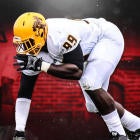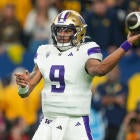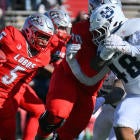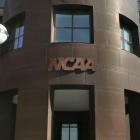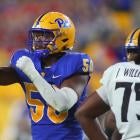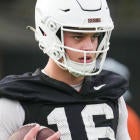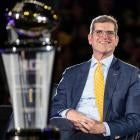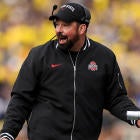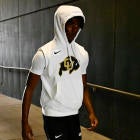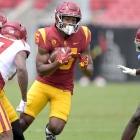PITTSBURG, Kan. -- At the low point, Jeremy Faulk was sneaking food from the Baylor training table.
Last June, the Bears’ budding redshirt junior defensive lineman had lost his scholarship suddenly and with finality. Faulk was not only kicked off the team and out of school, he was essentially wiped from Baylor records in a day without being told what the specific allegations were against him.
One thing was for sure: His head was spinning. The meal card that players can swipe at training table check out suddenly didn’t work.
The former national junior college defensive player of the year had no money, nowhere to go and barely a place to lay his head.
“I stayed with another D-lineman on his couch,” Faulk told CBS Sports, recounting the days immediately after being kicked out of Baylor last summer. “It was a little rough. I spent all my Pell [Grant], staying on his couch, sneaking food out of Baylor.”
Somehow there is justice to Faulk literally getting nourishment out of the back door of the athletes’ food court. Because the allegations against Faulk are -- to this day -- so muddled, he has a puncher’s chance in next month’s NFL Draft.
“Jeremy almost created a situation they don’t have rules for,” said Jeff Sims, his junior college coach.
Could it be that a school derided for ignoring sexual assault victims overreacted in Faulk’s case? A daring suggestion but no matter what you think of him, Faulk has endured a legal, academic, athletic and administrative wringer.
Soon after Art Briles was fired in late May, Faulk was questioned by school officials about two incidents. One of them allegedly occurred during his time at Florida Atlantic in 2013.
He and a friend had reportedly teased a teammate who was naked in bed with a girlfriend. Faulk and his friend threatened to pull off the sheets. Campus police were called, no charges were filed.
“We were just joking around and they used it against me,” he said.
Last April, a female student at Baylor spoke to police about a sexual encounter with Faulk and another man. Again, no charges were filed, although the school did start a Title IX investigation.
Eight days after Briles was fired, Faulk became the first Baylor player to be kicked off the team in the wake of the scandal.
Faulk reiterated to CBS Sports the sex was consensual.
“My mom taught me not to do sympathy,” Faulk said. “I should have carried myself better. I should have stayed in my room. Being a college football player, I tried to go out one weekend.”
The combination of multiple negative factors -- Baylor’s tarnished brand, the accusations, Faulk’s prior academic struggles -- made him a college football pariah.
As the 2016 season approached, Faulk endured an ultimate absurdity. With few football options left, he was forced to re-enroll at Garden City Community College, a school from which he had already graduated in Kansas.
The nation’s best defensive junior college player in 2015 returned to become defensive MVP of the NJCAA national championship game in December.
Faulk never played a down in FBS. His college career is complete having spanned four stops at three schools over four years. He has entered the 2017 NFL Draft, incredibly still as an underclassman after all that time.
Yes, Faulk is in the same junior draft class as Florida State star tailback Dalvin Cook. That’s about where the similarities end.
“I wanted to be an All-American,” he said. “It was my dream to play [Division I football]. Everything happens for a reason.”
For a quiet, athletically freakish kid from Palatka, Florida, that reason has yet to reveal itself.
Not quite an angel, but never charged with a crime, Faulk is the player college football forgot.
His talent cannot be denied. His former defensive coordinator at Baylor compared Faulk to former All-Big 12 defensive tackle Andrew Billings.
One-time acting head coach Jim Grobe said of Faulk, “The defensive coaches thought he was nearly unblockable.”
His NFL agent ran all the issues past his wife before taking on this new client.
“I won’t take a person who assaulted or raped a female,” said Markeeth Taylor, a former defensive back at West Chester University. “I had to dig, dig, dig to have him be in my household.
“If I didn’t believe in the kid, I wouldn’t have taken him, and my wife wouldn’t have allowed it.”
Earlier this month, Faulk sat on some stairs in Pittsburg State’s indoor facility telling his story. He had just shined at a small-college pro day essentially organized to showcase his talents.
“There’s only one guy [NFL scouts] here to see,” said former Fort Scott Community College coach Curtis Horton, on hand basically as a football fan.
At the end of the five-hour process, Faulk was the only player asked to stay after, ushered into a back room to take the Wonderlic Personality Test.
Reasons to take a chance on Faulk were evident during that pro day. At 6-feet, 304 pounds, he vertical jumped 31.5 inches. He threw up 38 reps of 225 pounds on the bench (officially it was 33; an NFL scout monitoring the drill docked him five reps for not “locking out” his elbows). Faulk ran a pair of 40s right at 5 seconds flat.
“Five, really?” he asked, disappointed.
Faulk claims to have run a 4.8 at the facility where he trained in Mississippi.
All of it conjures an image of a slightly smaller B.J. Raji, a former Pro Bowl defensive tackle and ninth overall pick by the Green Bay Packers in the 2009 draft.
To get to his last collegiate game four months ago, Faulk traveled with his Garden City teammates 18 hours in a bus with no bathrooms from southwestern Kansas to Yuma, Arizona.
Faulk then made four tackles, including a sack, to become the defensive MVP in a national championship game win over Arizona Western.
“Anytime we had to win the game, anytime we had to turn it up, he was the one who made the play,” Sims said.
Faulk’s Baylor coach and junior college coach could agree on one thing: “When he wanted to be,” Sims added, “Jeremy was virtually unblockable.”
The reality is Faulk will be a draft long shot. No matter what you think of him, it will be safer for any NFL team to bring him in as an undrafted free agent. Few players would have traveled his athletic and academic path. Try to follow:
- Coming out of Palatka High, Faulk signed with Florida Atlantic, where he redshirted under Carl Pelini in 2013. Pelini resigned during that season.
- As a redshirt freshman at FAU in 2014, playing for the scout team, Faulk became academically ineligible.
- That led to a transfer to Garden City, where Sims coached. Sims had been on Pelini’s staff at FAU when Faulk arrived. In 2015, Faulk became the national junior college defensive player of the year. His future seemed limitless with 18.5 tackles for loss, 7.5 sacks, 87 tackles and even 46 rushing yards to go along with two touchdowns.
- Blowing up in junior college led to an offer from Baylor. In December 2015, Faulk transferred to Baylor. That upward arc continued.
That’s when then-defensive coordinator Phil Bennett compared Faulk favorably to Billings, the 2015 Big 12 co-Defensive Player of the Year.
“He had things you don’t coach,” Bennett said of Faulk. “Without question, he’s a Sunday player. I can justify taking him.”
For six months, Faulk said, he holed up in his apartment at Baylor.
“I’d just go to practice, classes and be in my room,” said. “I did everything they asked. I was loving it, to be honest.”
Then one weekend and that admitted encounter with a woman.
“There is a reason why we shouldn’t sleep around before we get married,” Taylor told Faulk. “You chose to do that. There are consequences to it. It’s not bad, and it’s something both of you guys agreed to, but it backfired.”
There are layers to this complicated story. The woman who made the police complaint told ESPN last year Faulk and his teammate “forced me to do things that I didn’t want do against my own consent.”
A source told CBS Sports text messages exist from that time that exonerate Faulk.
Faulk eventually won back his scholarship after an appeal. However, he was still not admitted back on the football team. There were questions raised last year about the legality of Baylor’s dismissal of Faulk.
Faulk has an attorney, and any legal action against the school would likely come after he signs a contract -- that way it will not interfere with his draft evaluation.
Baylor’s decision basically made sure Faulk wouldn’t get a degree, at least while on football scholarship. Any FBS team taking him would have had to petition the NCAA for a sixth year of eligibility in 2018 (after he sat out 2017).
Few, if any, coaches were going to fight for a player kicked out of Baylor that had one year of eligibility remaining. Faulk could have gone Division II but that would have required him to re-take a full load of classes this semester he had already passed at Garden City to be eligible at that level in 2017.
What was the point of that?
Perhaps it’s not fair, but you can imagine the NFL mindset: Why take a chance drafting a junior college player with a sketchy background?
Well, there’s a reason at least 11 NFL scouts came to Garden City last season, according to Sims. It was Sims who organized a conference call with 17 NFL teams so they could ask anything they wanted about Faulk.
“At first, I was unknown,” he said, reconsidering his chances. “I’m not just a random name now.”
Sims himself is a living, breathing underdog, so Faulk’s story resonates. Sims’ father did five years in prison for conspiracy to commit murder. Sims’ players at Garden City have overcome incredible odds.
Faulk figures to be the latest.
“Baylor brought Jeremy Faulk to Baylor,” Sims said. “If he would have become an All-American there, they would have gotten all the publicity.
“The day it got difficult, they flushed him out.”












